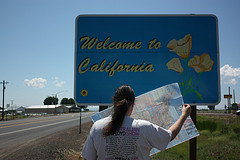Californians Rush To Buy Before Amazon Starts Collecting Sales Tax
Starting September 15, Amazon.com will start collecting sales tax on purchases made by residents of California. So with the clock counting down, a number of shoppers in the state are buying what they can in the next week and a half.
“I’ve ordered nine things in the last two weeks,” one Californian tells the L.A. Times about his last-minute purchases. “Any time you can save money, that’s a good thing.”
Another man explains to the Times that he intends to save hundreds on new computers in the coming days.
“It makes a huge difference,” he says. “If there’s anything else I can think of where I can fork up some money and save a couple hundred bucks, I probably will.”
Of course, these shoppers are not technically saving money — and it would be a mistake to label these purchases as tax-free — since buyers are still supposed to pay any applicable sales taxes when they file their tax return.
The fact that most Amazon shoppers (presumably) do not fess up to owing this money is part of the reason states have been making deals with the online giant — it puts money (sales tax in CA runs anywhere from 7.25% to 9.75%) in the states’ coffers and saves everyone the cost of a possibly lengthy legal battle that could ultimately go either way.
Though Amazon is keeping mum on any uptick in sales from California, the Times reports that evidence on social media points to a definite cash-in from frugal Californians.
Amazon had enjoyed the freedom from the onerous tax of collecting sales tax thanks to a federal law that only requires e-commerce sites to collect a state’s sales tax if the company has a bricks-and-mortar retail location in that state. Since Amazon had no such outlets anywhere in the U.S., it didn’t have to worry about collecting taxes.
Then states began going after Amazon’s affiliate program, which allows third-party sellers to use the site as an online storefront. A number of these sellers have actual retail locations, which some lawmakers said meant that Amazon must collect sales tax.
Meanwhile, some states argued that Amazon’s warehouse and distribution centers were the same as having a bricks-and-mortar store.
At first, Amazon attempted to counter by cutting off affiliates or shutting down warehouses in disputed states, but as the challenges grew, the company began making deals. And all this is happening while the federal government pushes for a federal law regarding online sales tax collection.
Bricks-and-mortar retailers have pushed for Amazon to collect taxes, claiming it is only fair.
“Every retailer has the ability to match a price, but no brick-and-mortar retailer can say to a consumer, ‘Don’t worry, I won’t collect that sales tax,'” said a spokesman at the Retail Industry Leaders Assn. “That 6 to 10% price advantage is a huge problem and distorts the free market.”
At least the people of California had a while to do their not-exactly-tax-free-but-sort-of-if-you-know-what-we-mean shopping. We here in Pennsylvania only had a few days — and during a holiday weekend at that — before hearing that taxes were be to collected and the taxes actually being collected.
Californians spend freely on Amazon.com before sales tax deadline [L.A. Times]
Want more consumer news? Visit our parent organization, Consumer Reports, for the latest on scams, recalls, and other consumer issues.


